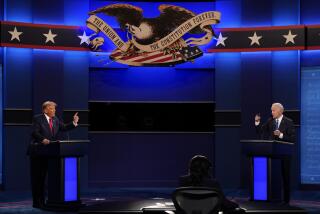‘It Is Beautiful That It Has Concluded This Way’
- Share via
YORBA LINDA — Their grandfathers’ argument in a mock-up of an American kitchen made Cold War history.
Now the grandson of President Richard Nixon and a granddaughter of Soviet Premier Nikita Khrushchev sat side-by-side Sunday, 36 years to the day after Nixon had predicted in a speech that Khrushchev’s grandchildren would live in freedom.
“Nixon was right and Khrushchev was wrong,” Nina Khrushcheva told the crowd gathered at the Richard Nixon Library & Birthplace on Sunday.
“When I think about it now,” she said, “it doesn’t surprise me. Mr. Nixon and Mr. Khrushchev were required by history to do what they did to make history move.”
Smiling broadly, Christopher Cox, 17, generously agreed. “I’m sure the spirit of this moment would have meant a lot to both our grandfathers,” he said.
The moment was a far cry from the one in 1960 when then-Vice President Nixon made his famous prediction in a speech accepting the presidential nomination of the Republican Party. Responding to a statement the Russian leader had made during the well-known kitchen debate the year before, Nixon said, “When Mr. Khrushchev says our grandchildren will live under communism, let us say his grandchildren will live in freedom.”
The two men’s verbal duel in 1959 in Moscow, in what became known as the “kitchen debate,” had taken place in a model American kitchen. Nixon poked Khrushchev’s chest for emphasis as he lauded the merits of U.S. products and the system that produces them.
Both incidents highlighted the nature of the Cold War, when the United States and the former Soviet Union competed bitterly on the world stage--militarily, politically and economically.
In 1960, Khrushchev sent shock waves by angrily banging his shoe on a table during a meeting of the United Nations General Assembly. And two years later during the Cuban missile crisis, he brought the world to the brink of war by installing nuclear weapons 90 miles from the United States.
Currently, Khrushchev’s granddaughter, 32, is studying comparative literature at Princeton University. The former Soviet Union recently held its first democratic elections.
Library Director John H. Taylor thought it fortuitous to bring the two grandchildren together to kick off the library’s newest exhibit, “ ‘46/’96 The Politics of Peace: The Uncertain Legacy of Victory in World War II and the Cold War.”
“I don’t believe that any president had a more intuitive grasp of the dynamics of the East/West struggles,” Taylor said of Nixon’s Cold War policies. “It was the central issue of his life.”
*
The issue certainly was in evidence as Taylor guided Cox and Khrushcheva--smiling and sharing stories--on a tour of the Nixon library prior to Khrushcheva’s lecture on Soviet history and politics.
“I thought he was taller,” Khrushcheva said, posing next to a statue of the famous grandfather who died when she was 8. She paused thoughtfully before continuing. “But then,” she said, placing her hand about waist high on the statue, “I was only this high.”
Cox, one of four Nixon grandchildren, looking at an exhibit depicting Nixon’s post-presidency living room, recalled how he and his grandfather used to watch baseball games there.
“This was one of my favorite rooms,” said Cox, who will work as a page at the Republican National Convention in San Diego. “We were big baseball fans.”
Both described their grandfathers as kind, sensitive and attentive.
“He was a wonderful grandfather,” Khrushcheva said of the former premier. “He was very warm and a true Communist right to the end.”
Later, during a reflective moment, she described the emotion of Sunday’s meeting.
“I believe in circles,” she said. “We have made a circle, and we are done. It is beautiful that it has concluded this way and here we are, two grandchildren talking together.”
The significance of the moment wasn’t lost on members of the audience, many of whom lined up after Khrushcheva’s speech to get autographs on copies of Nixon’s 1960 speech.
“This was very inspirational for me,” said Julie Gray, 61, of La Habra. “It symbolizes that a new generation is coming up, and we have to depend on them to pursue peace in new ways. It gives me a lot of hope.”
More to Read
Sign up for Essential California
The most important California stories and recommendations in your inbox every morning.
You may occasionally receive promotional content from the Los Angeles Times.













